The personal touches in Her Majesty's colourful funeral flowers
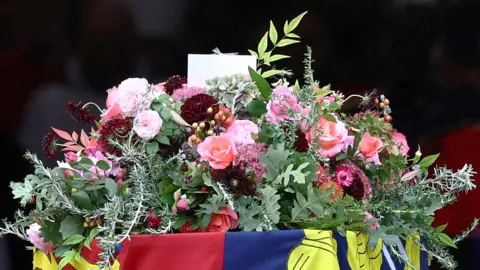 Reuters
ReutersBlooms of gold, pink and deep burgundy, sitting amid rich green foliage, adorned the Queen's coffin during her funeral service. The colourful flowers and plants, taken from the gardens of royal properties, were chosen for their symbolism.
At King Charles III's request, the wreath for Her Majesty's funeral contained flowers and foliage cut from the gardens of Buckingham Palace and Clarence House in London - and Highgrove House in Gloucestershire.
It included foliage chosen for its symbolism:
- Rosemary for remembrance - rosemary has long been associated with remembrance
- Myrtle, the ancient symbol of a happy marriage, cut from a plant that was grown from a sprig of myrtle in The Queen's wedding bouquet in 1947
- English oak, a national symbol of strength, in a nod to the Queen's constancy and steadfast duty. It also symbolises strength of love
In among the flowers was a handwritten card which read: "In loving and devoted memory, Charles R."
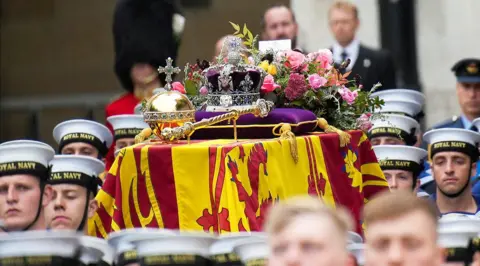 Reuters
Reuters
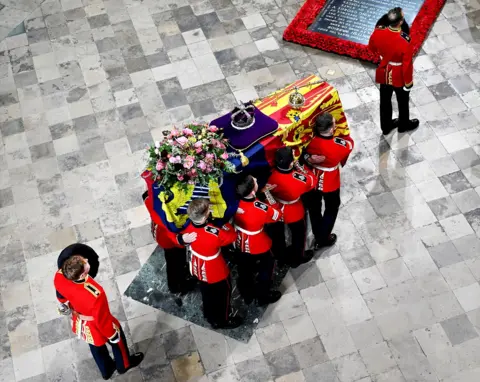 Reuters
Reuters
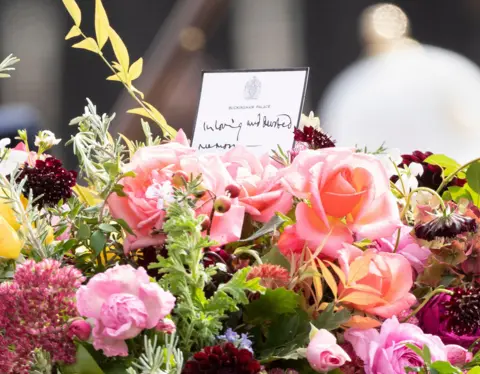 Alamy
Alamy
The flowers in the Queen's funeral wreath featured scented pelargoniums, garden roses, autumnal hydrangea, sedum, dahlias and scabious, all in shades of gold, pink and deep burgundy, with touches of white, to reflect the colours in the Royal Standard flag on which it sat.
Royal funeral wreaths have traditionally been sombre, in white and green tones, says Gemma Kavanagh, from London florist Moyses Stevens, but the colours of the flowers can also be chosen to reflect a flag - which is what we saw on Monday.
King Charles is well-known for his commitment to the environment and, at his request, the wreath was made in a sustainable way - without the use of floral foam but, instead, created in a nest of English moss and oak branches.
Rosemary, a herb, has long been a symbol of remembrance because herbalists thought it was good for memory, says Prof Fiona Stafford, author of The Brief Life of Flowers. "But rosemary is also associated with love and loyalty, and it was used for marriage bouquets or for burials, as well for strewing on the dead. So it's a really, really appropriate one to be part of the wreath," she says.
Rosemary also featured when the King gave his first TV address to the nation. He was flanked by a portrait of his mother on one side and a small silver vase with sweet peas and sprigs of rosemary on the other.
The Queen loved flowers from her garden - every Monday, the gardeners at Buckingham Palace would send up a fresh posy of flowers for her desk when she was in residence. Gardener Alan Titchmarsh recalled in an article that the Queen "loved primroses, lily-of-the-valley and other modest blooms far more than elaborate exotics; something that speaks volumes about her personality".

White wreaths
Unlike Monday's colourful wreath, more traditional white funeral wreaths sat atop the Queen's coffin on her final journey from Balmoral, via Edinburgh, to Westminster Hall in London. But all included personal flowers cut from royal gardens.
When the Queen's coffin left Balmoral Castle, it was accompanied by a wreath made of dahlias, sweet peas, phlox, white heather and pine fir, all collected by her staff from the Balmoral Estate. The sweet peas echoed the Queen's choice of flowers for her husband, Prince Philip's wreath in 2021.
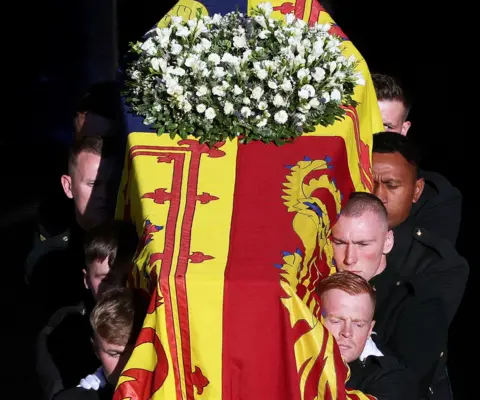 Reuters
ReutersWhen she was lying in state in Westminster Hall, the wreath included pine from the gardens at Balmoral - and pittosporum, lavender and rosemary from the gardens at Windsor.
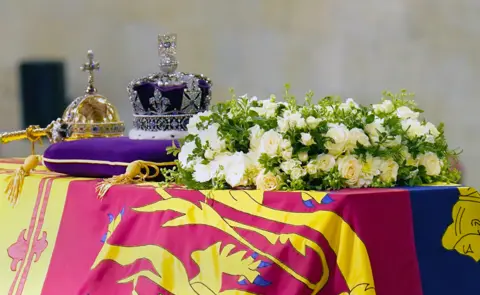 Reuters
ReutersThe Queen was buried with Prince Philip in the King George VI Memorial Chapel, Windsor on Monday. The flowers in St George's Chapel included:
- Longiflorum lilies "Watch up", Bouvardia "Royal white", Dahlia "Caro", Dahlia "Maarten Zwaan, Eusroma "Rosita" (Lisianthus) and Rose "Avalanche"
- With greenery: Eucalyptus "Popules Bes", Soft ruscus, and other greenery picked from Home Park


